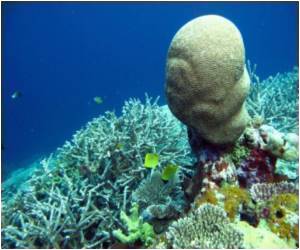
The coral animal and the associated zooxanthellae depend on each other for survival in a symbiotic relationship, where the coral supplies the algae with nutrients and a place to live. In turn, the algae offer the coral some products of their photosynthesis, providing them with an important energy source.
High water temperatures can block photosynthetic reactions in the algal cells causing a build-up of toxic oxygen compounds, which threaten the coral and can result in a loss of the zooxanthellae.
Without the algae, corals appear white, a state which is often referred to as 'bleached'. Bleaching often leads to coral death and mass coral bleaching has had already devastating effects on coral reef ecosystems.
The study of University of Southampton, published in the latest issue of the journal Nature Climate Change, has found that nutrient enrichment of the water can increase the probability of corals to suffer from heat-induced bleaching.
Within the coral, the growth of zooxanthellae is restricted by the limited supply of nutrients. This allows the algae to transfer a substantial amount of their photosynthetically fixed carbon to the coral, which is crucial for the symbiotic relationship.
Advertisement










